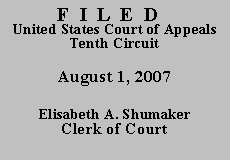

| CHARLOTTE L. DYE,
Plaintiff-Appellant, v. MICHAEL J. ASTRUE, Commissioner, Social Security Administration, Defendant-Appellee. |
|
We review the magistrate judge's decision regarding the amount of attorney's fees awarded under EAJA for abuse of discretion. Pierce v. Underwood, 487 U.S. 552, 571 (1988). While the magistrate judge obviously gave careful thought to this case, we respectfully disagree with his conclusion for three reasons.
First, the magistrate judge relied on certain language from Hensley v. Eckerhart, 461 U.S. 424 (1983), as authority for subtracting from appellant's fee request the time she had spent on two unrelated "claims" on which she had not prevailed in court. See Aplt. Opening Br., Ex. J at 5-6 (citing Hensley, 461 U.S. at 435-36). We believe that other language in Hensley is more apposite to this case. Hensley was not an EAJA case, but, rather, involved fees awarded under the Civil Rights Attorney's Fees Awards Act of 1976, 42 U.S.C. § 1988. Hensley, 461 U.S. at 429. Hensley also involved distinct and separate claims for relief, not appellate issues. See id. at 426-28. In contrast here, appellant successfully argued one issue in this court and obtained a remand, although she did not prevail on the other issue she presented to us and did not even raise a third issue that the district court had rejected. In this regard, the Court held in Hensley that
[i]n these circumstances the fee award should not be reduced simply because the plaintiff failed to prevail on every contention raised in the lawsuit. Litigants in good faith may raise alternative legal grounds for a desired outcome, and the court's rejection of or failure to reach certain grounds is not a sufficient reason for reducing a fee. The result is what matters.
Hensley, 461 U.S. at 435 (citation omitted) (emphasis added).
Second, the Court subsequently held in Commissioner, Immigration & Naturalization Service v. Jean that the district court has discretion under EAJA "to 'reduce the amount to be awarded . . . to the extent that the prevailing party during the course of the proceedings engaged in conduct which unduly and unreasonably protracted the final resolution of the matter in controversy.'" 496 U.S. 154, 161 (1990) (quoting 28 U.S.C. § 2412(d)(1)(C)). The Court added, however, that "absent unreasonably dilatory conduct by the prevailing party in 'any portion' of the litigation, which would justify denying fees for that portion, a fee award presumptively encompasses all aspects of the civil action." Id. (emphasis added) (quoting 28 U.S.C. § 2412(d)(2)(D)). The Court explained that "[w]hile the parties' postures on individual matters may be more or less justified, the EAJA--like other fee-shifting statutes--favors treating a case as an inclusive whole, rather than as atomized line-items." Id. at 161-62.
Third, this court recently discussed Jean in Hackett v. Barnhart, 475 F.3d 1166 (10th Cir. 2007), where the plaintiff had not asserted distinct and related claims, but, rather, had asserted several different arguments or reasons in support of a single claim for a remand. We pointed out that in light of Jean, "an issue-by-issue approach is . . . not appropriate" in a fee case. Hackett, 475 F.3d at 1173 n.1. We held that because the plaintiff had persuaded us to remand based on a reversible error, "the fact that the Commissioner prevailed . . . on most issues did not alter the fact that [he] acted unreasonably in denying benefits at the administrative level." Id.
The magistrate judge can hardly be faulted for not taking Hackett into account, since that case was decided after he issued his decision. But this case is analogous to Hackett--although appellant lost on two of the three issues she pressed in court, her remaining issue convinced us that the Commissioner improperly denied her claim for disability insurance benefits. She prevailed on her sole claim for relief--that "[t]he Commissioner's decision was not supported by substantial evidence and not free from legal error." Aplt. Opening Br. at 22.
All things considered, we respectfully believe that the magistrate judge's decision was in error, and we reverse and remand for additional proceedings.
REVERSED and REMANDED.
Entered for the Court
Circuit Judge
*. After examining the briefs and appellate record, this panel has determined unanimously to grant the parties' request for a decision on the briefs without oral argument. See Fed. R. App. P. 34(f); 10th Cir. R. 34.1(G). The case is therefore ordered submitted without oral argument. This order and judgment is not binding precedent, except under the doctrines of law of the case, res judicata, and collateral estoppel. It may be cited, however, for its persuasive value consistent with Fed. R. App. P. 32.1 and 10th Cir. R. 32.1.